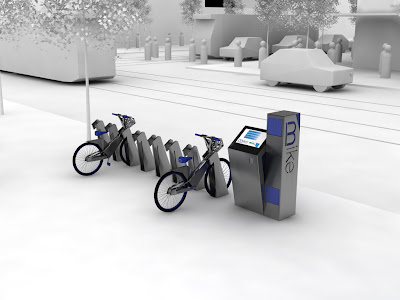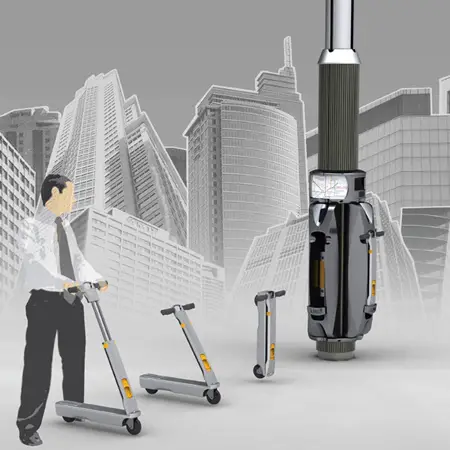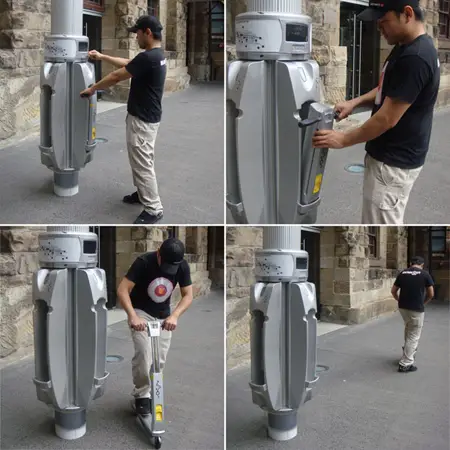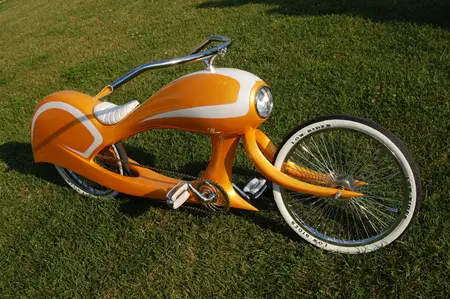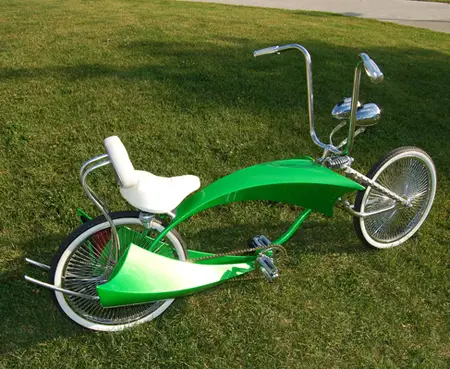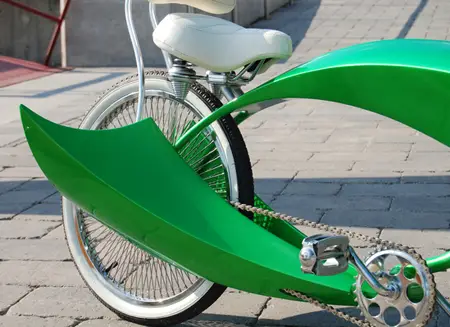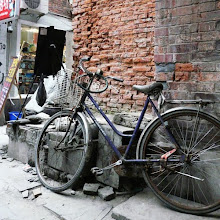Tuesday, June 1, 2010
Thursday, May 13, 2010
Thursday, May 6, 2010
Why Cyclists Should Pay For Rego
A common comment that I hear from motorists is that cyclists should pay for rego. The argument goes like this, "Cyclists use the roads therefore they should pay to use them".
It is usually in the form of a rant from some angry driver yelling out their car window or obnoxious media personality. It sounds simple enough, but not only is this argument flawed in its logic, it's also a simple fact that the money from rego goes towards insurance and administration rather than construction and maintenance of roads. Roads are not a a user pays system. If you pay taxes, you pay for the roads. If you're a motorist who argues for a user pays system for roads, you should be careful what you wish for. You could end up paying much more than you already do.
The reason why cyclists do not pay rego is because the potential for bicycles to cause damage and harm is negligible compared to motor vehicles. There's no disputing the simple fact that motor vehicles seriously injure and kill people every day. Even though cyclists take up less space than cars and incur no additional costs on the road system, I argue that cyclists should indeed have the option to pay for rego. Besides the fact that it would bury this ridiculous argument and get motorists off our backs, there's a more important reason - insurance.
In Victoria the insurance that rego pays for is called TAC. Every state has something similar. This is a no-fault insurance scheme which provides excellent cover, particularly for serious traffic accidents. Fortunately as cyclists we are covered by TAC if involved in an accident with a motor vehicle (technically, the vehicle needs to be running).
However, when a cyclist is involved in an accident that does notinvolve a motor vehicle we are left uninsured by TAC. The public insurance system will cover the majority of the costs however ambulance and therapy thereafter may be expensive and elective surgery could be a lengthy wait. If the accident is catastrophic (e.g. spinal or brain injuries), private insurance may only cover a portion of the costs. The amount of therapy needed and lifestyle modifications required for a catastrophic injury could amount to a small fortune. If cyclists had the option to pay rego, TAC would provide adequate cover for all severe injuries that occur on the road.
The majority of serious cycling accidents involve a motor vehicle so there's a good chance that TAC would cover the costs. However, a situation such as crashing on a high speed descent or suddenly hitting a stray dog could result in severe or catastrophic injuries that would not be covered by TAC.
Unfortunately a registration scheme derived specifically for bicycles would likely cost more to administer than the insurance premiums themselves. However, an add-on to the current TAC scheme could conceivably work well at a fraction of the cost of a separate policy. I don't know a single cyclist who doesn't also own a car (and therefore pays rego), so an add-on to our vehicle registration would be a logical step to implement.
Along with vehicle registration comes license plates. Another common argument is that bicycles should have a means of identification. I agree with this in theory as I'd like to see cyclists be accountable for their actions, however when have license plates ever deterred reckless hoons? I see motorists break laws every day and I've never reported a vehicle for a minor infraction. I don't see the problem of reckless cyclists being solved with license plates. Give this a try at home: ring the police and report a speeding car. Give the number plate and say you saw the driver doing 70km/h in a 60km/h zone. What do you think the reaction would be?
Bikes have been outselling cars in Australia for nearly a decade now. If cyclists paid rego it would not only provide adequate insurance for us in the most serious of situations, it would give cyclists a more powerful voice to guide road policies and legitimize our use of the road.
Sunday, April 25, 2010
Mike Design Direction


Monday, April 12, 2010
Concept Boards
 This bike is inspired by the increasing emergence of angular forms around Melbourne. From Vault in the 1980's through to Storey Hall and Federation Square, and finally the new Metro Trains graphics and Melbourne Council logo, this trend seems to be forging a unique Melbourne image. The bike is formed of superplastic aluminium for a lightweight yet strong frame which also shows off the different faces of the design. The helmet matches the bike styling, and also incorporates the hard outer shell with velcro-in inner lining system.
This bike is inspired by the increasing emergence of angular forms around Melbourne. From Vault in the 1980's through to Storey Hall and Federation Square, and finally the new Metro Trains graphics and Melbourne Council logo, this trend seems to be forging a unique Melbourne image. The bike is formed of superplastic aluminium for a lightweight yet strong frame which also shows off the different faces of the design. The helmet matches the bike styling, and also incorporates the hard outer shell with velcro-in inner lining system.Tuesday, April 6, 2010
Bike to Basics

A grassroots movement to rediscover the bicycle has spawned alleycat racing in China, which dovetails neatly with Shanghai's plan to green the city for Expo 2010 and promote bike use, Matt Hodges reports from Shanghai
Tyler Bowa moved to Shanghai last year to teach English, not spark a revolution or redesign the social fabric of a hyperactive youth culture that is starting to go nuts for bikes.
Things just panned out that way.
The company he founded, People's Bike, has evolved into a community of cycling enthusiasts, a grassroots movement that dovetails with the municipal government's push to build a greener city for Expo 2010, where bike rental depots are commonplace.
"Next year China is going to become the cultural hub of fixed-gear biking," says Bowa, fully bearded but barely out of university. "When I moved here 12 months ago I couldn't find one shop selling these kinds of bikes (in Shanghai). Now there are six or seven. It's becoming much more affordable."
With China's increasingly fashionable and bike-friendly youth warming to the idea of new sports like "bike polo" and alleycat racing, Bowa predicts the number of riders nationwide will triple by next March, led by progenitors in Guangzhou who pick up trends from nearby Hong Kong.
"In the past 12 months everything has skyrocketed out of nowhere," Bowa says. "Maybe, what we are seeing now is the start of a professional alleycat circuit in China."
Alleycat racing has riders plot the fastest way around a city by navigating their way from checkpoint to checkpoint. There are usually 10-15 racers spanning a distance of roughly 30 km. It's been around for some 20 years but has been big business in the United States and Japan for the past four or five years.
Bowa, the foreign figurehead of the sport here, began by sending out tweets last year looking for other bored biking enthusiasts. Then he organized "bike polo" matches on Saturday afternoons among friends.
These quickly blossomed into BBQs and social events, with more than 100 Chinese and expats turning up to hammer homemade mallets through traffic cones and drink beer.
Together with his business partner Karl Ke, Bowa organized Shanghai's first-ever alleycat race, in November, taking their cue from alleycat's China debut six months earlier in Beijing.
"Alleycat is usually an underground sport restricted to fixed-gear bikes, but we opened it up to all models and all ages," the 22-year-old says at a coffee shop in Tianzifang, a labyrinth of Bohemian cafes and shops in downtown Shanghai.
"We got some critiques afterward from big websites around the world that we went overboard, but then people started coming to us for advice saying they wanted to copy our model in other cities.
"I guarantee there will be two more cities (joining the circuit) this year."
Meanwhile, a sports media company that is big in Asia made an offer to buy People's Bike last week and hire the Canadian to apply his management model to a dozen websites it owns, spanning everything from skateboarding to marathon running. Bowa declined.
The speed with which the activity is catching on in southern China, where electric and pedal-powered bicycles are increasingly giving way to cars, has left most of the embryonic fixed-gear biking industry shell-shocked.
"It's still relatively small in China compared to other cities worldwide, but it's growing fast," says local enthusiast Mattias Erlandsson.
Racers at the Shanghai event included one 55-year-old French lady, who finished runner-up in the women's category. Highlighting its sub-culture appeal, the "track" wound its way from a famous graffiti wall in Moganshan Road to a tattoo shop near the Bund.
It is this kind of broad appeal and growing demographic that is making sports brands like Puma and Adidas vie to sponsor future races, of which there will be at least a handful nationwide this year, including in Hangzhou and Guangzhou.
"Fixed-gear culture aligns with youth values of freedom, self-expression and simplicity," says John Soloman, director at design firm Enovate, which targets China's youth market.
"As the government and organizations continue to focus on the environment, we believe biking will become an important way for youth to take action."
A raft of new measures has been introduced in recent months to promote the culture of cycling and the ecological advantages it brings to the city, which used to play home to the world's largest bicycle industry.
The "Good to Shanghai - 01Cool Bike" program has installed vast tracts of new bike lanes in the city, while the Shanghai Forever Bicycle Company plans to rent bikes out during the six-month Expo.
Local companies have picked up the thread and built sightseeing trips around two-wheeled entertainment. China Outside Adventure organizes tours of neighboring cities; while Shanghai Sideways provides historic tours of the city from the comfort of a vintage 1930s-style motorbike sidecar.
While older Chinese are glad to ditch their bikes and wash their hands of what for many symbolizes centuries of poverty, "a lot of people in their 20s are organizing trips by themselves, riding from city to city or going mountain biking up in the hills", says Fiona Li, owner of China Outside Adventure.
"What people soon realize about fixed-gear biking is that it's not just fashionable, fun to customize, a little bit edgy and dangerous, or even healthy," Bowa says.
"It's also the most practical way of getting around. For example, I can get from the French Concession to the Bund, or anywhere within the inner ring road, in less than 10 minutes. Try doing that in a taxi."
The concept of Alleycat racing sounds cool. Wonder if it could work in Melbourne?
Monday, March 29, 2010
Friday, March 26, 2010
Monday, March 22, 2010
Saturday, March 20, 2010
Green Eye Candy and Orange Tequila Sunrise Bicycles
"With the sunrise orange color and the perfect white shades, the Tequila sunrise bicycle is really offering an ideal visual according to its name. Even you can compare the body of this bicycle, made of laid fiberglass over steel frame, with a rising sun. During giving the final shape, fabrication of the bicycle’s body has not been done with molds; rather the designer chose to put fiberglass over the top expanding foam. This bike may not seem quite ridable at the very first look but the designer has worked hard to make things easier. The curved handle allows the rider to maintain a comfy sitting even though the distance of the seat from the front wheel is considerably longer.
Eye Candy is a green bicycle with an innovative design and all steel body, ideal for all range of riders. The bicycle was designed to keep a lightweight bike concept in mind and therefore, it doesn’t include any unnecessary body parts. This candy green painted bicycle includes completely functional tail lights in the back pods which maybe the most uncommon feature of a bicycle. Besides, it has grilles and hand made backrest to ensure the riders comfort and fork support in the wheels to offer better durability."
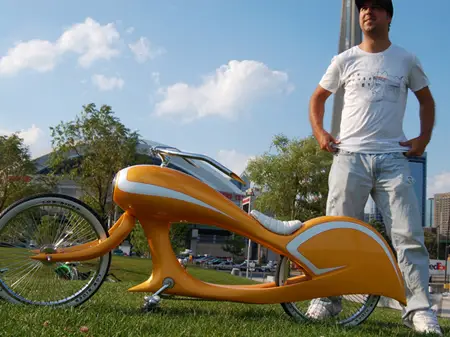
Wednesday, March 17, 2010
Melbourne Bike Sharing

Monday, March 15, 2010
Sunday, March 14, 2010
Indian Bike Sharing System
 India has its first bike-sharing service with FreMo, or Freedom to Move, in Thane, outside of Mumbai. FreMo was created by entrepreneur V. Ramesh to be a profitable business that successfully fights climate change. This service has six indoor "stations" and a fleet of 100 bikes. Subscribers get a smartcard upon registering and may also borrow a helmet before leaving a station.
India has its first bike-sharing service with FreMo, or Freedom to Move, in Thane, outside of Mumbai. FreMo was created by entrepreneur V. Ramesh to be a profitable business that successfully fights climate change. This service has six indoor "stations" and a fleet of 100 bikes. Subscribers get a smartcard upon registering and may also borrow a helmet before leaving a station.Ramesh was first exposed to bike-sharing when visiting Barcelona where he saw Bicing. "The idea appealed to me so much that I quit my job in the financial sector and devoted the whole year to ground research for this project," said Ramesh to Hindustan Times.
Being a for-profit business, FreMo has a different pricing model than is commonplace with other services. FreMo offers multiple pricing plans to provide his customers options for varying needs of use. The one-time registration fee is 499 rupees ($11 USD), an annual membership fee of 199 rupees ($4.34 USD), and a variable usage fee based on the selected plan of 0.08 - 0.30 rupees (less than $0.01) per minute.
Friday, March 12, 2010
Beijingers get back on their bikes
By Michael Bristow BBC News, Beijing |
 Competition between bike makers is becoming fierce |
Office worker David Dai is one of a growing army of Beijing residents returning to two-wheeled transport.
But the 28-year-old does not rely on his own pedal power - like hundreds of thousands of others, he has bought an electric bike.
These battery-powered, and virtually silent, machines have become increasingly common on the streets of the Chinese capital.
With roads often clogged with cars - there are now four million vehicles in Beijing - they offer a speedy way to get around.
But not everyone seems to like them: government officials are unsure about how to deal with this explosion of electric bicycles.
Congested streets
China used to be known as the "kingdom of bicycles". In the 1980s, four out of five commuters pedalled to work on them in Beijing.
But as the capital's residents became richer following economic development, they ditched their bikes for four-wheeled transport.
Recent statistics suggest that only one in five city residents now use an ordinary bicycle to travel around.
In a matter of just a few years Beijing has gone from a city with few private cars to one where traffic jams are commonplace.
But many Beijing residents are now buying electric bicycles to avoid wasting time on congested streets.
"It takes only 10 minutes to ride my electric bike from home to work," said Mr Dai.
 Hundreds of thousands of people have bought electric bicycles |
"If I took the bus, I'd have to spend time waiting for it, and then I could be trapped in a traffic jam. It could take me half an hour to make the same journey."
These bikes are on sale everywhere, with shops sometimes clustered together. Their wares are lined up on the pavement in neat rows.
Zhang Zhiyong, the manager of a store selling a brand of electric bike called "Capital Wind", said it is easy to see why sales are booming.
"Beijing is not like other smaller cities - it's big. If people ride their bicycles to work, they get really tired. If they drive to work, the roads are often congested," he told the BBC.
"But an electric bike is environmentally friendly and convenient. Promoting the use of these bikes would benefit us all."
And they are much cheaper than cars. The most expensive model in Mr Zhang's shop is only 2,680 yuan ($390:£260).
Public outcry
But not everyone is convinced by the shop owner's argument.
Many ordinary bike riders complain that the fast, silent electric bikes that now whizz about the city are a menace to other road users.
Late last year the government announced it was going to issue guidelines on what could be considered an electric bike.
Officials initially planned to bring in rules that defined an electric bike as a something weighing less than 40kg and travelling at less than 20kmh.
A bicycle that was heavier and travelled faster would be considered an electric motorbike.
 Bicycles once used to rule the roads in central Beijing |
The owners of these larger machines would have to get a licence, register their motorbikes and buy insurance.
But the government scrapped the introduction of the new guidelines after a public outcry.
"There's been a big debate in China about exactly how to deal with electric bikes," said Vance Wagner, who works for a transport research centre linked to China's Ministry of Environmental Protection.
But with the number of electric bicycles increasing all the time, the government might find it hard to put off forever a decision on how to classify them.
"Many people don't realise that the population of electric bikes is actually growing way faster than the population of cars," explained Mr Wagner.
The sale of electric bikes has slightly dropped off recently as people wait to see how the government will tackle the problem of how to define one.
But, ultimately, it is something else that might kill off sales.
Some experts believe they are a stop-gap form of transport; a link between an ordinary bike and a car.
As Beijing car owner Richard Liu put it, cars give a clue to a person's status - the more successful they are, the bigger the car they own.
"I think 80% of Chinese people want to have a car, even if they don't have much money they will buy cheaper ones," he said.
So while they are popular now, electric bicycles might one day prove as unwanted as the pedalled variety.






